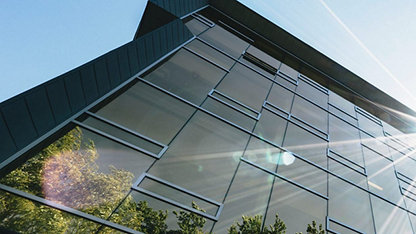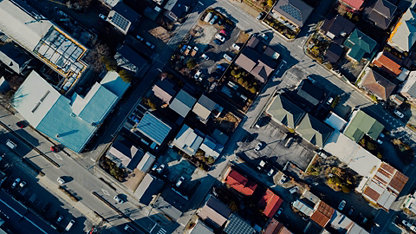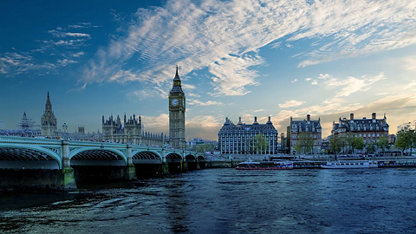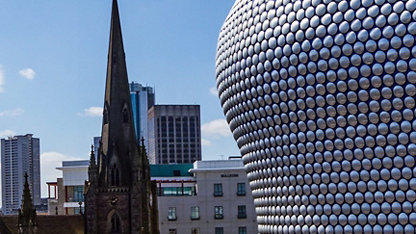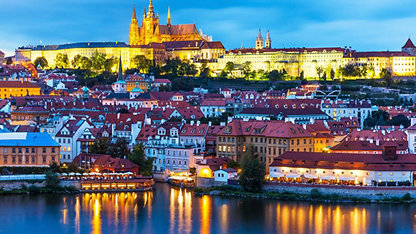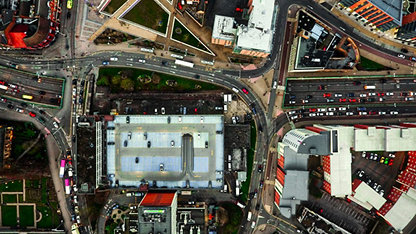RICS COP28 Case Study
CTPark Amsterdam City
Introduction
CTPark Amsterdam City is a pioneering, large-scale, last-mile, logistics hub located close to the heart of the city of Amsterdam. It is owned, operated and developed by CTP Group, Europe’s largest listed owner, developer and manager of logistics and industrial real estate by gross lettable area, owning 11 million sqm of GLA across 10 countries.
CTP Group’s objective in acquiring this speculative development was to meet the rising demand for premium, last-mile low-or zero-emissions logistics facilities. De-carbonising logistics, which underpins modern society by supplying everything from food to manufactured goods, will help meet the important goals of cutting carbon dioxide emissions and achieving international environmental targets. Logistics real estate is particularly important as it incorporates two major sources of carbon dioxide emissions with buildings responsible for 40% of global emissions, while transport contributes 28% of global emissions.
CTP Group is committed to generating renewable energy across all its logistics parks in Europe and is rapidly expanding renewable energy power across its portfolio. It ended 2022 with 38MWp of installed photo voltaic (PV) capacity and is on target to add an additional 100 MWp during 2023 with the aim of delivering 400MWp by 2026. Its fast-growing in-house energy business provides its occupier customers with clean and secure energy, enabling them to reduce their total costs and further their own sustainability goals.
CTPark Amsterdam City is CTP Group’s flagship, pioneering scheme in terms of its renewable energy and sustainability ambitions, with the objective of designing a logistics hub to be self-sufficient in energy and provide emissions-free facilities. It also fits in with CTP Group’s social element of its ESG ambitions through reducing harmful transport emissions to improve the health of local communities.
Project overview
CTPark Amsterdam City is a logistics facility offering 120,000 m2 of warehousing by gross lettable area and flexible workspace, located close to Amsterdam’s A10 ring road and the city’s centre.
The building provides renewable energy generated by 13,000 solar panels and 10 wind turbines on its roof and stored and distributed through a smart energy management system. Its emissions-free transport infrastructure boasts 212 EV charging points for electric vehicles, ranging from trucks to small vans and cars. With its own 360-metre quay alongside the North Sea Canal where ships can be loaded and unloaded, CTPark Amsterdam City allows goods to be quickly transported by boat as well as electric truck or e-bike to end users in the city.
Warehousing with a clearing height of 10.5m is offered on the ground floor and first floor, complete with truck loading docks, while mezzanines allow each of the warehouse floors to be expanded by a further 80,000 m2. Above is 10,000 m2 of flexible office space with access to a 4,000 m2 roof garden.
The combination of meticulous attention to energy efficiency combined with its renewable energy generation and EV infrastructure, has enabled the building to achieve an A+++++ Dutch energy performance certificate rating for the offices with zero carbon emissions in operation and it has been awarded a BREAAM Excellent rating.
Construction work on CTPark Amsterdam City commenced in 2021 with the building being completed in Q2 2023.
Challenges
From an energy perspective, a major challenge facing the development team was creating a flexible energy infrastructure system to match the varying needs of potential occupiers for this pioneering, large-scale renewable energy-powered logistics hub. Rather than outsourcing the renewable energy system to an external energy company, CTP Group constructed the energy infrastructure itself to provide its tenants with greater flexibility for their changing energy needs. With no comparable case study or model to follow for such a project of this scale, CTP Group – along with its partners – were essentially acting as pioneers.
The technical challenge was to engineer the right type and combination of energy assets. There is now 5.7MWp solar glass-on-glass photovoltaic panels installed on the roof and 10 roof-mounted wind turbines, while 1 MWh of battery storage for renewable energy will be installed before the end of the year.
Adding to the challenge was the flexibility to cater to a potentially wide range of tenant energy and transport load requirements. In the parking garage there are already 200 vehicle-to-grid AC chargers installed for smaller EVs, i.e. cars and vans. This means that in the future the EVs can act as additional batteries for the building and solar panels. In addition, there is a fast charging area with 12 240KW DC chargers where electric trucks, vans and cars can charge within 30 minutes. The building and electrical installations are already prepared to install chargers at every bay in the parking garage and at the 200 loading docks.
Besides the project’s ESG goals, it has also been designed to achieve decent returns on investment, which is expected to grow over the coming years.
Solutions
With incorporating renewable energy systems on such a large scale being unprecedented, CTP Group partnered with renewable energy specialists to deliver its own energy generation, management and charging infrastructure at CTPark Amsterdam City. As a part of this, a bespoke EMS solution had to be developed.
Although developing this energy infrastructure in-house required significant investment, by pioneering the technical solutions at CTPark Amsterdam City, CTP Group and its energy partners were able to develop the best green energy solutions at the right price for current and future projects. Because CTP Group owns and operates the energy system, it can make sure it fits the needs of the tenants as it is not dependant on an external energy supplier.
Outcomes
Through CTP Group’s partnership to develop its own flexible energy system, it can now provide energy to tenants better tailored to their needs, which can be applied to future developments.
In terms of accolades, with its large-scale renewable energy generation generating more than 5 GWh a year, on top of its energy efficiency credentials, the logistics park has achieved the BREEAM Excellent certificate and the highest possible Dutch energy performance certificate rating of A+++++ for the offices.
With the project only recently completed it is too early to get a measure of its in-use performance. However, the building’s energy system is an important contributor to its overall return on investment, which will become more apparent in the future with the growing use of EVs and the upcoming ban on fossil-fuel vans and trucks in the city of Amsterdam from 2025.
Lessons learned
By not outsourcing the energy assets CTP Group has gained expertise and ownership of its renewable energy and management system, providing more control to develop and tailor it to tenants’ requirements.
Although this initially involves an investment of upfront capital expenditure, this model is more flexible for both the asset owner and tenant. It provides the opportunity for long-term, affordable and sustainable energy supplies for tenants and the ability to tailor support as their needs evolve as part of a long-term landlord-tenant relationship.
Conclusion
By taking the more difficult route of building its own renewable energy and green transport infrastructure, CTP Group has created at CTPark Amsterdam City a template that can be rolled out to its current and future logistics developments. Furthermore, it serves as an inspiration to the real estate sector as a whole on what can be achieved in meeting the challenge of delivering a first-class functional logistics building while meeting sustainability and commercial goals.





